

Team Transitory’ hasn’t given up hope of winning the great inflation debate.
That was the tag given to everyone — from Federal Reserve Chair Jerome Powell on down — who expected pandemic price-spikes to be short-lived. With inflation still breaking records all over the world, they essentially lost that argument.
But there remain plenty of economists who argue that the shock will soon fade, as supply blockages ease and energy costs stabilize. Some warn that central banks are in danger of making a big mistake by raising interest rates too aggressively even as price pressures show signs of peaking.
With inflation now exceeding 8% in the euro area, and expected to stay above that level in the U.S. when May data comes out on Friday, here’s a roundup of some of the main arguments laid out by Team Transitory 2.0.
Central banks argue they can raise interest rates at a pace that allows their economies to achieve what’s known as a soft landing. Skeptics say they’ll tip their economies into recession by tightening too much, with inflation likely to undershoot targets again as a result.
History illustrates the risks: The European Central Bank in 2011 raised borrowing costs only to be forced to reverse them later that same year while the Bank of Japan in 2006 raised rates and had to unwind that move in 2008.
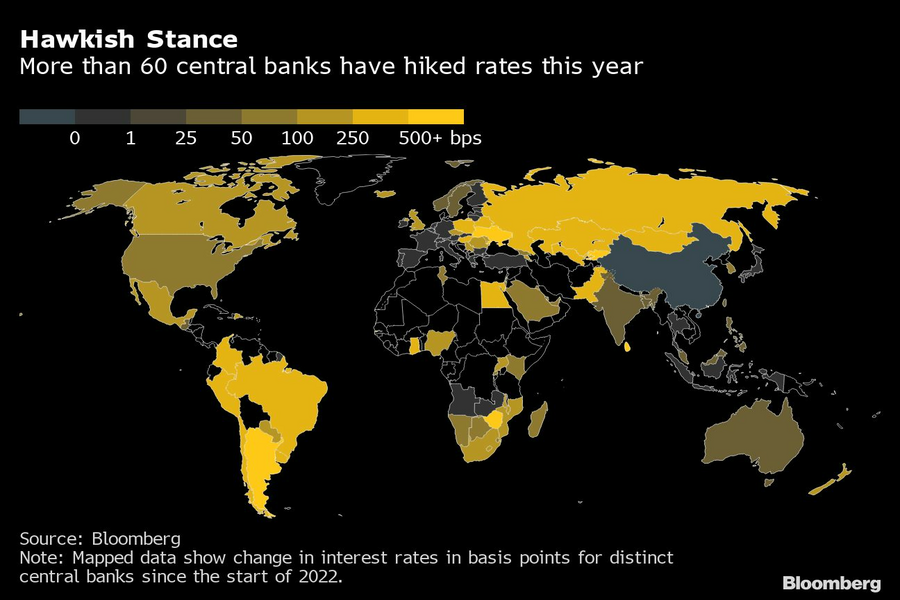
Ongoing supply chain blockages prompted retailers to stock up on the goods they need to ensure they can meet demand. With signs that consumers are growing cautious as interest rates rise, that’s now leaving an overhang of goods that will add downward pressure on prices.
Inventories rose $44.8 billion, or 26%, for businesses on S&P consumer indexes with a market value of at least $1 billion, according to data compiled by Bloomberg of companies who reported earnings in late May. Economists at Morgan Stanley warn that the risk of an inventory glut is growing, especially in sectors such as consumer discretionary and technology goods.
House prices soared in many countries during the pandemic thanks in part to central banks bringing interest rates to historic lows and pumping money into their economies by quantitative easing. While house prices aren’t always included in inflation baskets, rental costs are, and they often reflect the same dynamics.
As inflation took off in 2021, borrowing costs started going up to tame it. There are now signs that house prices are cooling. Global growth in real house prices slowed to a 4.6% annual rate in the final quarter of 2021, down from 5.4% in the previous three months, according to the Bank for International Settlements. In real terms, they estimate that global house prices exceed their immediate post-global-financial-crisis average levels by 27%, suggesting plenty of scope for a correction. As interest rates rise, so will the repayment burden on consumers.
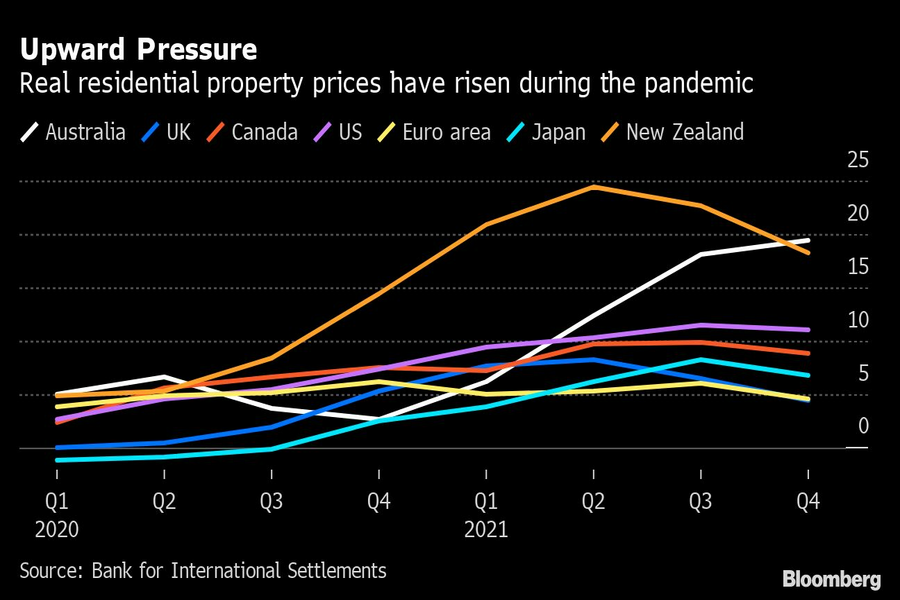
China’s slowdown, driven in part by new Covid restrictions, will be a deflationary shock for demand across the global economy. It’s most likely to show up in commodity prices, as Chinese purchases of everything from industrial metals to agricultural products and energy get scaled back.
Bloomberg Economics calculates that a 1 percentage point slowdown in Chinese industrial production can shave as much as 5 percentage points off global oil prices. China is the world’s biggest buyer of iron ore, and it accounted for 40% of global demand for copper in 2020 and as much as 30% for nickel, zinc and tin.
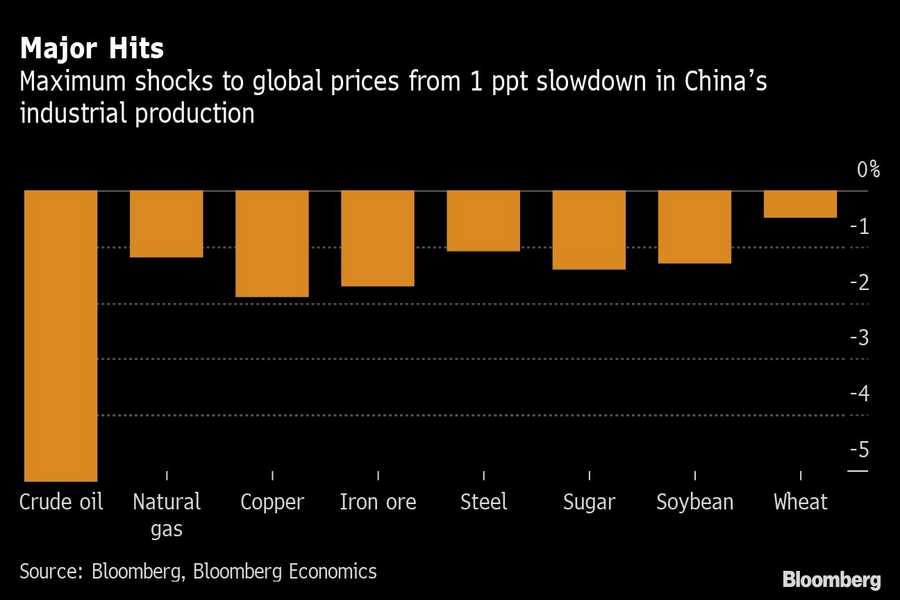
Japan is the world leader in experiencing a long deflationary bust and has seen many false dawns when the hoped-for return of inflation couldn’t be sustained. It’s too early to tell if this time will prove different. Consumer prices recently hit the Bank of Japan’s 2% target, driven by surging energy prices, but limited wage gains continue to keep consumers skittish. And the BOJ remains committed to stimulating Japan’s economy on the view that the current inflation spike is transitory.
“I expect the world to swing back from historic inflation to disinflationary and deflationary pressures,” said Takahide Kiuchi, an economist at the Nomura Research Institute in Tokyo and a former BOJ board member. “Inflation will come down at the expense of monetary policy tightening and an economic slowdown. The price trend will ultimately be dictated by the potential global growth rate, which is weakening due to the pandemic and the Ukraine situation.”
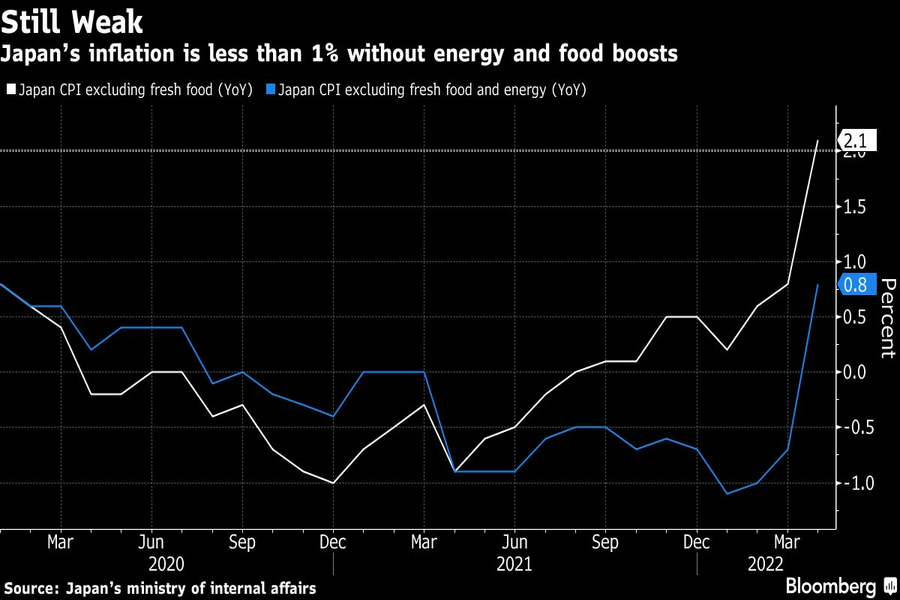
Economists at the Peterson Institute for International Economics identified a shift in long-run inflation expectations, partly due to better central-bank policy, as one reason why U.S. prices stayed subdued for much of that period.
“The public has expected that inflation, even if buffeted in the short run by shocks, would return in the longer run to its low, normal level,” they wrote. “That expectation, in turn, has almost certainly helped stabilize actual inflation.” And they noted that even after a year of soaring prices, long-term inflation expectations aren’t much higher than they were a decade ago.
Meanwhile, bond investors have been trimming their inflation expectations in recent weeks.
Some of the current inflation spike has been magnified by what are known as base-year effects. Essentially, inflation was high when year-on-year price changes were measured against a time earlier in the pandemic when economies stalled, and costs slumped. But soon, they’ll be measured against the current elevated level of prices instead — so some of that effect will reverse.
Regions such as Europe that rely on imported energy may see a greater fall in inflation than others if the price of fuels like oil and gas were to quickly cool.
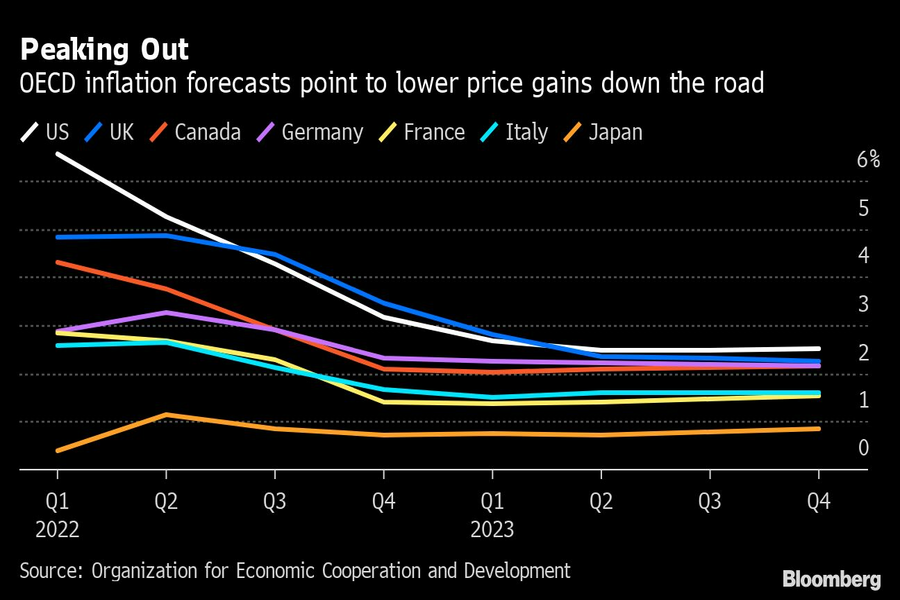
“Commodity prices will start retreating,” said Priyanka Kishore of Oxford Economics. “They will remain high by historical standards. But they are unlikely to keep climbing.” She expects that by mid-2023, food and energy commodity prices will drop by 10% to 15% from a year earlier, helping to bring overall inflation down.

A new proposal could end the ban on promoting client reviews in states like California and Connecticut, giving state-registered advisors a level playing field with their SEC-registered peers.

Morningstar research data show improved retirement trajectories for self-directors and allocators placed in managed accounts.

Some in the industry say that more UBS financial advisors this year will be heading for the exits.

The Wall Street giant has blasted data middlemen as digital freeloaders, but tech firms and consumer advocates are pushing back.

Research reveals a 4% year-on-year increase in expenses that one in five Americans, including one-quarter of Gen Xers, say they have not planned for.
Orion's Tom Wilson on delivering coordinated, high-touch service in a world where returns alone no longer set you apart.
Barely a decade old, registered index-linked annuities have quickly surged in popularity, thanks to their unique blend of protection and growth potential—an appealing option for investors looking to chart a steadier course through today's choppy market waters, says Myles Lambert, Brighthouse Financial.
